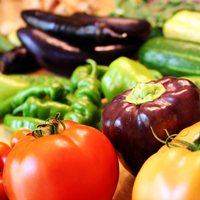You can grow your own food. By doing so you will be making an important contribution to positive cultural change and will take another step forward in your authentic living. Why? Because individuals and local communities that grow their own food do so more sustainably, and begin a process of consciously reconnecting with nature.
The food of mass society, which is transported an average of 1,500 miles to the consumer—often after being grown in toxic conditions by large scale agribusiness and further processed in factories—is a testament to unsustainable and unhealthy living. What can be more valuable to us than the very food we eat that nurtures our health and development, and that connects us with the Earth that sustains us? As we dissociate from our true self and our natural environment, it is not surprising that our food becomes degraded, along with the ecology of the land upon which it is grown. It is not surprising that we think that food comes from supermarket shelves—a product of the spectacle of materialism.
Why the Food Production of Mass Society is Unsustainable
The practice of energy-intensive farming by agribusiness, with the use of pesticides and fertilisers, heavy mechanisation, monoculture plantations, and genetically modified seeds to maximise profits, is ecologically and socially unsustainable. It now takes about 50 times as much energy to produce food as we get from eating it.
The practice of monoculture farming, in which large areas of forests are cut down to clear land for the planting of a single, highly profitable crop, such as wheat, maize, soybean, cocoa, and coffee, has harmful ecological consequences as habitats and ecosystems are destroyed, many of them being in tropical rainforests where biodiversity is at its highest and many species are endangered.
As a result of the intensive farming, soil becomes exhausted and depleted of essential nutrients. Chemical fertilisers are then used to feed the crop, which damage the soil even further, and contaminate the land and its groundwater. Over time, the depletion of soil quality and its subsequent erosion mean that the soil no longer supports crops, causing farmers to clear more forests to repeat the growth of monoculture crops in a deadly cycle.
Global biotech companies have been buying seed companies on a massive scale, resulting in three companies controlling the sale of half of the world’s commercial brand name seeds. As a result, traditional varieties of seed are being phased out in favour of their limited varieties of genetically modified and hybrid seeds, and supported by a food economy that is driven by supermarkets and fast food chains. This has meant that 75% of crop diversity has been lost in the last hundred years. Bt-toxins from genetically modified crops are now showing up in humans. The Bt-toxin has been linked with cancer, autism, severe food allergies and autoimmune disease.
The patents and property rights on biotech seeds mean that farmers have to pay a licence fee to the biotech companies for growing them, and are forced to purchase them again each year, rather than save them, which threatens their livelihoods while increasing the profits of biotech companies.
The Benefits of Growing Your Own Food
Growing your own food and supporting small-scale, local organic and ecological farming are important practices of authenticity and ecological living. Here are 9 powerful benefits of growing your own food:
- The food is whole, unprocessed, and—if organically produced—is free from toxic residues.
- The food is more fresh, nutritious, flavoursome, and healthy.
- The food is produced for local use, eliminating unsustainable transport costs and the need for irradiation and adulteration with preservatives.
- Small-scale organic and ecological food production honours the Earth by protecting habitats and biodiversity, working with ecosystems, supporting the restoration of soil, and using energy and resources sustainably.
- When food is grown in community gardens and allotments, or bought from local organic farms, community is built.
- Growing your own food connects you more consciously with the Earth and—with the practice of mindfulness—your ecological self.
- Growing your own food increases mindfulness of the link between the food that is eaten the place where it grows, and the way in which it is grown, so that we no longer think of food abstractly as a product from a supermarket shelf.
- Growing your own food increases self-sufficiency, and local community farming supports the local community economy.
- Food is produced to provide for the nutrition, health, and joy of individuals and their community, rather than for the profit of big businesses.
How to Grow Your Own Food
If you have not grown your own food before, start small. I would recommend starting by growing herbs such as mint in tubs, which is very easy to do. These tubs can be placed in your window area, on your balcony or patio, or in your garden. The herbs that you grow can be used in the kitchen for salads, garnishes, and sauces, and you will get a quick experience of the practice of farm-to-table. Alternatively, the herbs you grow can be used as a medicine. Mint, for example, supports the digestive system, and helps treat fatigue and lethargy as it is a stimulant—especially peppermint. Nutritionally, spearmint is richer in iron than spinach.
Once you have experimented with growing your own herbs in pots, your enthusiasm will have been generated and you can expand to growing food in larger pots or garden beds, community gardens, or allotments, depending on your choice. If you wish to grow your own food communally, the support of others will be of benefit: tools and other resources can be shared, and knowledge can be passed on, increasing resource efficiency. Community gardens can also provide a space for social interaction and for hosting community events linked with the gardens and the raising of awareness for authentic living.
Rather than use a limited variety of brand name seeds that are held by global biotech companies, try seeking out old, local varieties of seeds, which are natural and often have greater flavour. These seed varieties can be saved and shared with others. This is important given that 75% of crop diversity has been lost: such seeds need preserving and protecting.
Some Useful Food Growing Tips
- Try planting different seed varieties together. This can protect crops from disease and invasion. For example, when carrots and onions are planted together, they repel each other’s predators. Shade-loving crops such as lettuce can be planted with tall crops such as corn, so that the shade-loving crops are protected from too much sunlight. Planting different crops together like this is called companion planting, and is based on understanding the beneficial relationships between plant species.
- To support the health and fertility of the soil, crop rotation can be used. The garden, plot, or field can be divided into sections, with each section growing a different family of crop each year. Since each crop family has different nutrient requirements, the yearly rotation ensures that the soil is utilised differently each year and does not become depleted.
- Rock dust, compost, and mulch can be added to enhance the soil quality and improve the vitality of the crops.
- For large areas of agricultural land, cover crops such as clover can be planted when food crops are not growing. Cover crops increase soil fertility, prevent soil erosion, and help prevent weeds from becoming established. They can be ploughed into the soil as a mulch prior to the planting of food crops, or left growing as a living mulch.
- Rock dust, as well as re-mineralising the soil and increasing the nutritional value of the food, also helps to repel insect predators.
Like this article? Spread the word by sharing the link.







